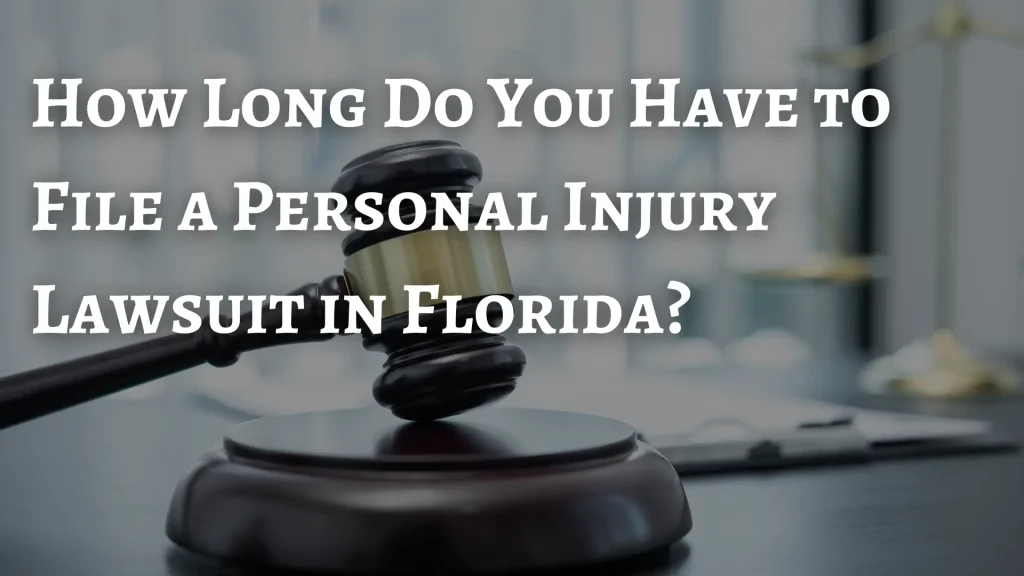 After an accident that injured you, you’re likely suffering in many different ways. You are probably dealing with physical pain, emotional distress, and financial hardships. In Florida, you have the right to seek compensation for your injuries when you’ve suffered because of someone else’s negligence or misconduct. This compensation can help you recover by paying your medical bills and easing the financial stress. However, you must understand the time limits for filing a lawsuit. If you fail to file within these deadlines, you risk losing your right to fight for compensation in court. That’s why it’s essential to understand the personal injury statute of limitations—it sets the legal time frame for taking action after an accident.
After an accident that injured you, you’re likely suffering in many different ways. You are probably dealing with physical pain, emotional distress, and financial hardships. In Florida, you have the right to seek compensation for your injuries when you’ve suffered because of someone else’s negligence or misconduct. This compensation can help you recover by paying your medical bills and easing the financial stress. However, you must understand the time limits for filing a lawsuit. If you fail to file within these deadlines, you risk losing your right to fight for compensation in court. That’s why it’s essential to understand the personal injury statute of limitations—it sets the legal time frame for taking action after an accident.
What Is the Statute of Limitations for Personal Injury in Florida?
A statute of limitations is a law that establishes a time limit you have for filing a lawsuit. As of March 24th, 2023, in Florida, this time limit has changed from four years to two years for personal injury cases to settle based on negligence under House Bill 837. If you believe you’ve been the victim of a personal injury due to someone else’s careless behavior, you have two years from the accident date to file your lawsuit.
It is worth noting that this change does not affect the timeframe for accidents that happened before March 24th, 2023. An accident that occurred before that date still falls under the four-year timeframe. That means that if the accident that caused your injuries happened on March 23rd, 2023, you have until March 23rd, 2027, to file your claim.
What Happens If You Miss the Deadline?
If you miss the deadline dictated by the statute of limitations, the court can dismiss your case without a hearing. Unfortunately, this means you will lose the opportunity to seek compensation for your medical bills, lost wages, pain and suffering, and any other losses you’ve suffered due to your injury. Even if the injury was sustained as a direct result of someone else’s negligence and your case has legitimacy, the court will likely not consider it if the complaint was filed after the deadline. Understanding the statute of limitations in personal injury cases is crucial because missing that window can mean losing your chance to seek justice and compensation.
It hardly seems fair for such a strict deadline to be placed on a victim trying to recover, but it’s essential to consider all the reasons for the statute of limitations. This law helps maintain the integrity of the justice system by:
- Preserving the integrity of evidence
- Protecting the defendant from indefinite liability
- Encouraging prompt legal action
Because of this, it is essential to act quickly after suffering an accident. Consult with an attorney as soon as you’re able to. A skilled personal injury attorney will help you get your claim in on time and prevent your case from being dismissed due to a missed timeline.
Tips to Protect Your Claim Before the Deadline
You can do several things to protect your claim before the deadline.
The first thing you should be aware of is Florida’s discovery rule. After an accident, injuries are not always apparent. Sometimes, symptoms can be delayed by hours, days, or weeks. It can be a while before the connection between the injury and the accident becomes evident, and every passing second is costing you precious time from the allotted two years. However, with the discovery rule, you can use the date of the discovery of the injury as the date of the accident, allowing your two years to start later than the accident itself.
There are a few other exceptions to the statute of limitations to be aware of. These exceptions include:
- Minor Plaintiffs: If the injury happened to a minor child, the statutory period may not start until they reach eighteen.
- Mentally Incapacitated Plaintiffs: If the injured party is mentally incapacitated, the period does not begin until the injured party regains mental competency.
- Fraud or Concealment: If the defendant attempted to conceal their negligence, the deadline may begin once the fraud is discovered.
Of course, the most important tip to protect you claim to act quickly. Even if you think an exception applies, take action as soon as you suspect negligence was involved in the accident. Don’t let any witnesses’ memories fade or evidence disappear.
Wrongful Death Claims
 Unfortunately, in the worst-case scenario, accidents can lead to wrongful deaths. If this happened to someone you love, you may wonder how the statute of limitations applies to you. Generally, you have two years from the date of death, not the date of the accident, to file your lawsuit on behalf of your loved one. However, there are some exceptions, including:
Unfortunately, in the worst-case scenario, accidents can lead to wrongful deaths. If this happened to someone you love, you may wonder how the statute of limitations applies to you. Generally, you have two years from the date of death, not the date of the accident, to file your lawsuit on behalf of your loved one. However, there are some exceptions, including:
- Medical Malpractice: In a medical malpractice case, the statute of limitations is usually four years instead of two. In the case of a wrongful death, this would give you four years from the date of the passing of your loved one to file a claim.
- Government Entities: If your loved one passed due to an accident involving a government entity, the deadline may be shorter. Additionally, there are specific requirements that have to be met before filing. Speaking to a lawyer who can advise you about these requirements is best.
Although this is most certainly a hard time for you, if you are seeking compensation on behalf of a loved one who suffered death at the hands of someone else’s negligence, it’s still important to act quickly. The timeframes may be different, but evidence is still crucial to protect.
Contact The Bruner Law Firm Before Time Runs Out
Florida’s statute of limitations can be confusing, especially with the changes and exceptions. The Bruner Law Firm is here to help you understand your rights so that you can file your claim in time to prevent the courts from dismissing you.
Please don’t take any risks when it comes to your compensation and the rights you have. Contact The Bruner Law Firm today at (850) 243-2222 to schedule a consultation, and let us help you understand your personal injury rights. We will fight for the compensation you deserve.







